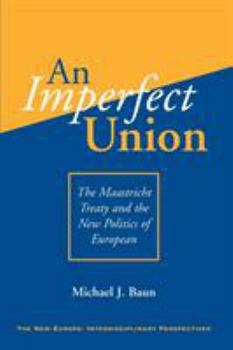An Imperfect Union: The Maastricht Treaty And The New Politics Of European Integration
Exploring the Maastricht Treaty process and the politics of European integration, the author argues that the end of the cold war and German unification have created a new set of geopolitical realities in Europe that have affected the nature and dynamics of European union.
Format:Paperback
Language:English
ISBN:0813327113
ISBN13:9780813327112
Release Date:March 1996
Publisher:Routledge
Length:198 Pages
Weight:0.75 lbs.
Dimensions:0.7" x 6.1" x 9.2"
Customer Reviews
1 rating
Highlighting The Issues of the Maastricht Negotiations
Published by Thriftbooks.com User , 24 years ago
Michael Baun's volume analyzes the Maastricht process from an intergovernmentalist perspective with an emphasis on the influence of France and Germany. His case study intelligently acknowledges the role of the smaller countries like Denmark in the Maastricht ratification crisis as well as the input and influence of Delors as European Commission President in the preparations for, and implementation of, the EMU conference.Baun's chapters provide an excellent sense of the historical evolution of the European Community (EC) before 1989, the events leading up to the convening of the intergovernmental conferences (IGCs), the Economic and Monetary Union (EMU) and Political Union negotiations, the ratification of the Treaty, including the initial Danish rejection of Maastricht in a national referendum and the post-Maastricht identity crisis. The chapter titled "Consolidating the Union" is a fine overview of the issues in Pandora's box opened by the Maastricht process such as the gap between political elites and popular opinion about the aims of European integration, the crisis in monetary integration and the challenges bound to arise in the subsequent 1996 IGC. Three challenges mentioned include the enlargement of the Union, the democratic deficit and what Baun terms "the continued German problem."This book highlights two logics - security and geopolitics, on the one hand, and interdependence and economic necessity, on the other. Baun argues that the events of 1989-90 established the logic of security as "the predominant force of European integration." His study, with its emphasis on realism, posits states as the major actors in world affairs. Baun writes that these two logics in operation since the late 1940s are logics of integration whose "relative importance for European integration has changed over time." (Baun, An Imperfect Union, 1996, 160) However, in contrast to Baun's analysis, Stanley Hoffmann's distinction between the logic of integration and the logic of separateness, made in his analysis of the relevance of the balance of power to the Nixon/Kissinger world of the early 1970s, remains valid.: "The logic of traditional international state politics is that of separateness." (Hoffmann, in The Great Nixon Turnaround, 1973, 291) In its entirety, Baun's volume is an extremely useful account of the Maastricht process that presents the key issues of the negotiations. The book, enhanced by Susan McEachern's meticulous editing, provides a highly readable narrative of the IGCs for university students and the general public alike.






